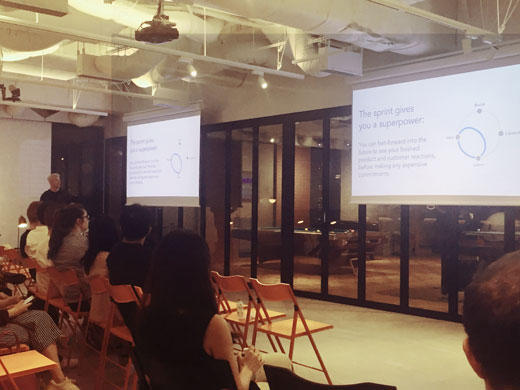Event Recap: Getting to Know UX in Tokyo
UX Marketing Manager - Jonathan Weeks
Last week I had the chance to attend the UX Talk Tokyo monthly meetup, which is one of the few English-language UX events in Tokyo.
The event functions as an opportunity for anyone interested in UX to network, listen to engaging talks by professionals, hear about potential job opportunities, and share knowledge. It is also shortly followed by a very lively nijikai (二次会), meaning afterparty, where attendees have further opportunities to make connections.
At the event I attended, UX TalkTokyo #37, Aaron Kovalcsik (of Indeed Tokyo) and Ryan Ruel (of AQ Works) gave talks about project management and interacting with clients.
Aaron's talk, "Using Sprints as a Superpower," detailed an internal design sprint using a modified version of the Google methodology. Some key takeaways were:
- A level of exploration exists in design sprints. It doesn't need to be by the book
- Sprints don't immediately solve problems, but give us a long-term vision of where to go
- For them, the sprint wasn't just about building a product; it was about building a global team that was cross functional and cross cultural

Ryan's talk, "Designing Deliverables," focused on how to better design deliverables for clients. The key takeaways were that good deliverables are:
- Easy to digest (quick and interactive)
- As easily shareable as possible
- Independent enough to stand on their own
- Creative and surprising
Both talks were insightful, but they reminded me of the challenges that face many Japanese companies when confronted by international competition. While international organizations are implementing more rapid development techniques like design sprints and streamlined deliverables, Japan has not been as quick to jump on board.
This is mostly due to the fact that a more "traditional" hierarchical business culture is still the mainstay for many companies, especially the large ones. While international companies may have their eyes on speed, Japan often takes an approach which focuses on precision thorough tried-and-true methodologies. The goal is to minimize the risk of mistakes and allow the implementation process to move without setbacks.
Of course, this is not the case for all companies; Japan is not immune to change. Since the bubble burst in the early 90's, many companies have made great strides toward adoption of global norms. And I think we're going to continue to see a drive toward more rapid and flexible strategies as international competition further pushes into the Japanese market.
